A UFC match wasn’t on my bingo card for this year, but ringside seats were too intriguing to pass up. Surrounded by shouting fans, my VIP perch had me at eye level to the ring with a clear view of the fighters’ grimacing faces as they circled, pounced on, and wrestled one another to the ground.
Physically, I’m nowhere near this fight, which is live-streaming from Las Vegas. Instead, I’m among 500 other guests for an immersive watch party near Los Angeles inside a three-story dome with a 180-degree 12K-plus LED display. Tiers of nightclub-style seating fan upwards from a floor lounge and bar—one of seven dotting 65,000 square feet of sleek interiors brimming with walled displays—while servers mill about with food and drink orders.
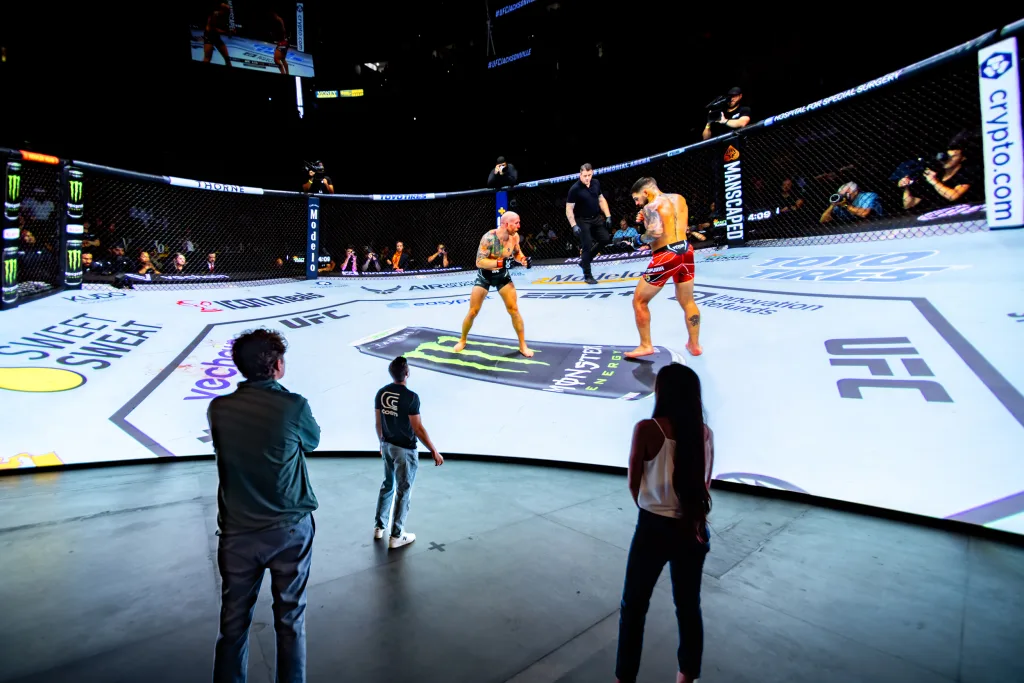
This is Cosm, an $80 to $90 million, 2,000-capacity venue that reimagines how immersive technology can enhance sports, entertainment, science and education, and travel. The scene at its June 29 unveiling evoked the VIP suite experience of the nearby SoFi Stadium—friends gathering for front-row viewing with high-end dining—but at a fraction of the cost.
“We call it ‘shared reality,’ because we combine the best of the immersive industry with the experience economy,” says Cosm’s charismatic CEO Jeb Terry, a former NFL player and Fox Sports executive. “It’s being able to showcase this transportive feeling of actually being wherever there is. That you and I are here in person is just better. It’s like fandom and the core human experience.”
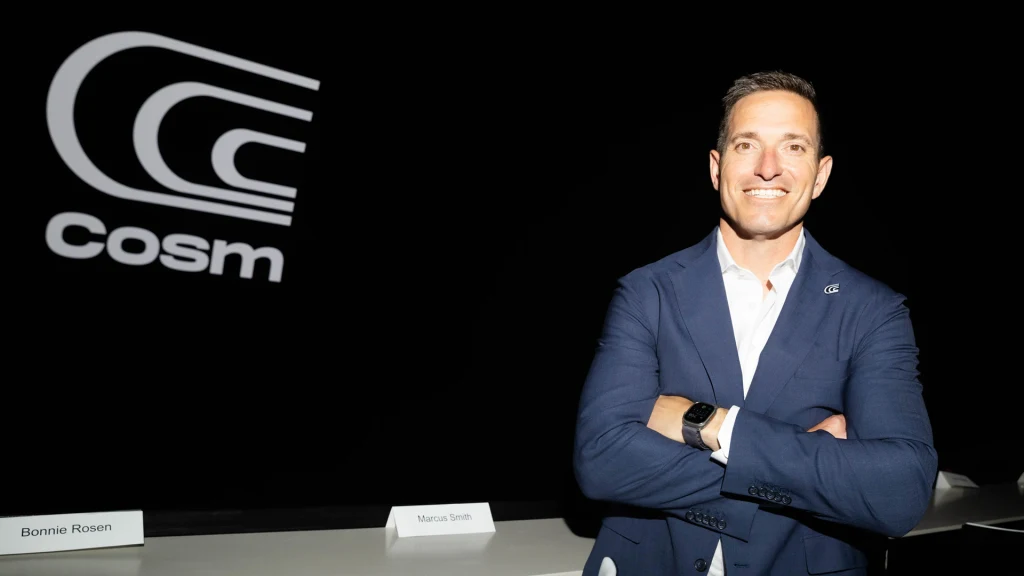
Although sports will drive the programming, additional summer fare includes more theatrical events featuring Cirque du Soleil’s O as well as trippy journeys across space, abstract landscapes, and philosophical mindscapes.
This location—in Hollywood Park, a 300-acre entertainment complex in Inglewood, near the Los Angeles Airport—is the first such venue. A second is slated to open near Dallas later this summer, with more planned. The company also has relationships with the NBA, NBC, ESPN, and TNT Sports, among others. Eventually, its principals envision a global network of Cosm locales with daylong programming costing roughly $20 to $200 a ticket covering overflow audiences from sold-out concerts, Olympics, the Superbowl, e-sports games, educational lectures, front-row seats to rocket launches, and virtual travel for those unable to make actual excursions.
Cosm sees itself as a complement—not a competitor—to other immersive entertainment, such as IMAX, Sphere, and theme park rides. Instead, it plans to distinguish itself with ultra-hi-res live content across programming and fan bases. “We’re not meant to try to supplant the cinema,” says Terry. “We’re trying to create a new category, a new experience.”
Programming partners—like the NBA, whose Cosm games begin in October—are betting on that heightened experience driving more viewers to their content. “Ninety-nine percent of our fans will never make it to an NBA arena,” says Teddy Kaplan, NBA’s VP of New Media Partnerships. “Part of my mission is to look for technologies that can bring the game as close to fans as possible. Seeing the NBA in the Cosm dome is the next best thing to being at a game. It feels like your feet are on the floor and these amazing athletes are running right by you.”
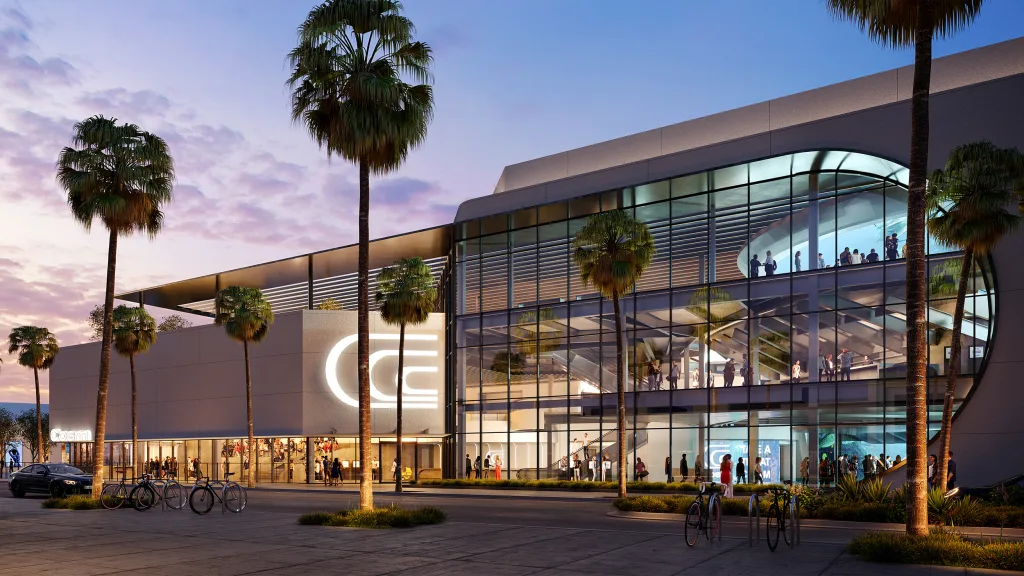
Roots in the sky
Behind the splashy Cosm venues is Cosm the company—a private Salt Lake City-headquartered tech firm whose core business is supplying and servicing display technology to more than 800 of the world’s planetariums and science centers. (Its name is an amalgam of “cosmos,” a nod to the company’s heritage in space education, and “colosseum,” which evokes bringing people together for live events.) The concept is the brainchild of Steve Winn, founder and CEO of Mirasol Capital and Cosm’s majority owner. Cosm formed four years ago after acquiring two companies, Evans & Sutherland and Spitz (now subsidiaries), that pioneered planetarium projection and immersive computer graphics technology.
[carousel_block id=”carousel-1720644908640″]
Cosm engineers refined its proprietary LED technology, incorporating real-time processing through cloud computing and Epic Games’s Unreal physics engine. The result is a sharper, brighter quality than historically projected images, with less light bounce across the dome. That makes for deeper blacks and more saturated colors. The display is 150 times brighter than the average planetarium, 40 times brighter than the best projection domes, and 10 times brighter than a flat-screen digital cinema, says Cosm COO Kirk Johnson.
The combination enables a more dynamic live capture. “We have a team on the ground at that big event who’s producing the content, has to distribute these incredibly high-resolution videos through the cloud to our venues and playback in real-time here,” says Cosm CTO Devin Poolman. “All that needs to work seamlessly.”
Interactive design
What also needed to work seamlessly was the interplay between digital immersion, social interaction, and the natural world of the Los Angeles coast. For this, Cosm turned to the Dallas architectural firm HKS, which designed the SoFi Stadium. “The ambiance is high-tech meets approachability, with a little bit of local appeal,” says Terry.
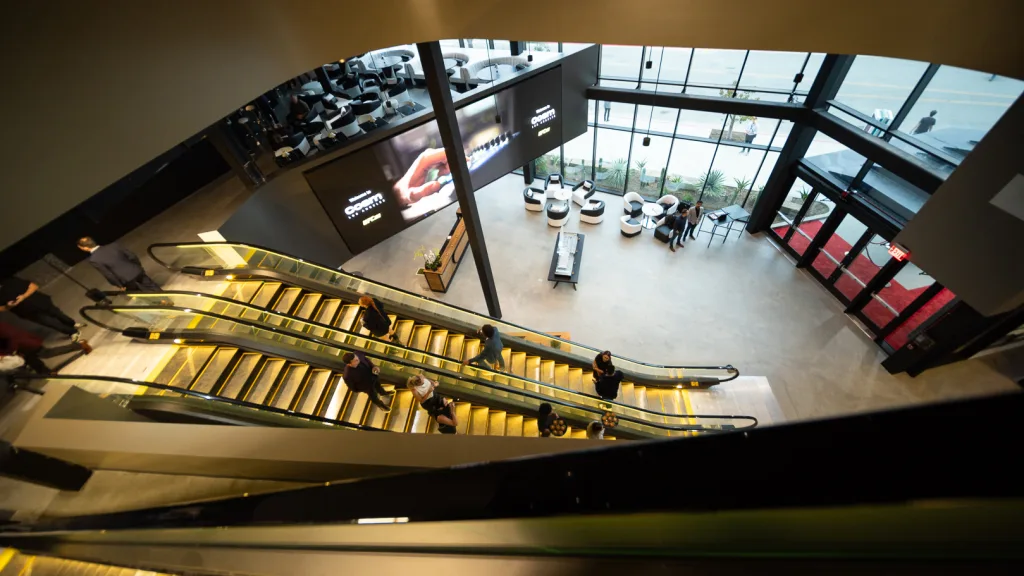
[Photo: Cosm]
The venue’s main entrance opens into a massive atrium of sleek, curved balcony lounges. A 50 by 150-foot curved LED display lines a wall, awash in sports feeds, player stats, color commentary, and slow-motion replays. Just ahead, a giant elevator beckons, rising against a barrier with openings just large enough to tease snippets of video and sound. Lured by the content, we ascend the escalator two floors for a full reveal of an encompassing digital world inside a domed LED display 180 feet high and 100 feet wide that has us virtual feet from the action. From the dome, we follow a walkway, peering down on the great hall below. Swoops and arches form subliminal letter “C’s” while muted tones guide our eyes toward the displays.
“We want the lobby to be active all the time with complementary programming,” says HKS Design Director Lance Evans. “When it’s sports, we can have the TV feeds coming out with data. When it’s art, we can have the art spill out into every nook and cranny. We don’t want wasted square footage. So, fans have all these unique spots to experience the venue.”
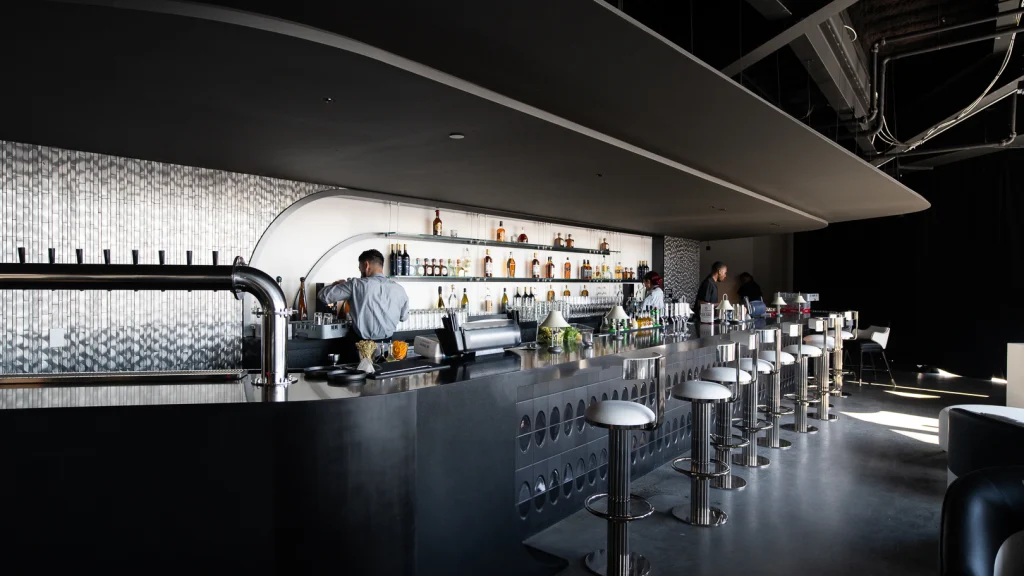
From here, the digital and natural worlds converge. The walkway curves around to glass walls that open to a rooftop bar and lounge enveloped in ocean breezes and panoramic views of Hollywood Park, SoFi Stadium, and Intuit Dome, the respective homes of the Rams and Clippers. Future venues will have these same three main components—the dome, hall, and outside deck—but with flourishes of their locations’ local flavor.
“We want this to be a place for people to not just come to the event and leave, but to linger,” says Poolman. “If this is a place for fans and community, it needs to be more than just a display. It needs to feel more like a clubhouse and a place for a party and taking a breath from the pressure outside.”
Login to add comment
Other posts in this group

The latest TikTok trend has people exposing their terrible exes and most toxic relationship stories to Lorde’s new single “ ">Man of the Ye

President Donald Trump announced, back on February 25, that his administration would soon debut a “gold card,” an immigration program that would allow wealthy foreigners, for the low, low price of

Singles are increasingly turning to AI to boost their odds in the dating world.
According to a new study, just over a quarter (26%) of singles are using artificial intelligence to enhanc

As AI car crashes go, the recent publishing of a

The Bible is now on TikTok, vlog-style.
Picture David—yes, that David, of Goliath fame—with an iPhone and influencer energy. “Asked the guy to film it, but guess what? The camera froze,”

“In three years,” a fellow tech executive recently told me with serene confidence, “Everyone will be able to make a full-length movie in AI, totally personalized for them, by just typing up a few

In 1999, I got to work on a literally once-in-a-lifetime project. As the 20th century was wrapping up, the magazine where I worked declared the personal computer the most important invention of th
